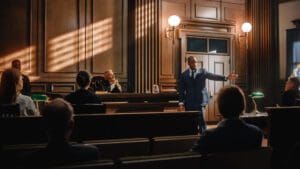____________
This article was written by Brian Vukadinovich, an experienced pro se litigant and the author of Motion for Justice: I Rest My Case.
____________
A recent post regarding civil Gideon, a proposed right to free lawyers for civil litigants, generated thoughtful feedback.
Having gone through the courts as a self-represented litigant, my opinions are strong on this topic. Like me, Mark Ferran, who chimed in via e-mail, has experienced the federal courts as a self-represented litigant. Below are our insights and recommendations.
MARK FERRAN
“The biggest problem pro se litigants face in New York’s state and federal courts is that trial judges tend not to consider the pleadings, memoranda of law, supporting affidavits, and motion papers of pro se litigants.
In order for a self-represented litigant to get real access to federal courts these days, three things must happen. First, a trial judge has to arbitrarily and unlawfully dismiss the case. Then, the case has to be kicked up to an appeals court. After that, the litigant must not make any missteps in the higher court. Without these, a pro se litigant can be stuck in the lower court with an un-winnable case, unable to obtain discovery or present a real case at trial.
New York state courts are similar in this regard. Trial judges serve as “clerks” for appellate courts and rarely consider pro se filings.
To get a fair hearing on appeal in New York’s state and federal courts, pro se litigants should take the following precautions:
- File comprehensive memoranda of law, anticipating legal arguments against the merits of the claim.
- Enter litigation with a mindset of appeal.
- Use trial level judges to move the case to appellate courts.
- Become familiar with and adhere to appellate procedures and time limits.
- Become mindful of issue preservation.
- Raise appealable issues in the lower court.
In this light, the concept of “a right to free lawyers for civil litigants” brings up two major considerations. The first is that many pro se litigants are very knowledgeable about the questions, issues, and laws in their case. Of necessity, they must delve into and understand substantive and procedural laws. They’ll know the law and their case better than both the judge and a “free” attorney.
Because of limited budgets and small public defender wages, free lawyers can’t spend much time on any one case. Thus, a free attorney could find himself in an adversarial position to a prepared and knowledgeable client and might end up doing more harm than good.
The second consideration is that the involvement of free attorneys will further encourage judges to omit and refuse to read and consider papers filed by pro se litigants. Rather, judges will assume that access to free attorneys is enough to satisfy due process requirements. People who refuse to accept representation from free lawyers will likely have continuing due process challenges.
A suggestion is to allow pro se litigants to obtain certifications from free lawyers. The certifications would alert the judge that he should read and consider the pleadings, memoranda of law, supporting affidavits, documentary evidence, and motion papers of a particular pro se litigant.
There is precedence for the certificate of merit in New York’s Consolidated Laws.
Unfortunately, if a certificate of merit system is implemented with current laws intact, the existing laws would hinder it. Under current laws, a litigant who hires an attorney is presumed to have waived the right to dismiss the attorney and proceed pro se. The exceptions are when an attorney alleges that he is not getting paid, or that his client’s position has no merit in fact or law.
There’s no recommendation here that a pro se litigant should be required to obtain a certificate of merit. The suggestion is that New York should modify laws that interfere with the right to appear, prosecute or defend oneself pro se.
In short, discussion of free lawyers for pro se litigants, which in itself is a contradiction, should begin with reform of existing laws.
Learn more about Mark’s cases.
Here are my own thoughts:
There is a need for serious judicial reform regarding pro se litigants in our federal judiciary. I experienced firsthand how a federal court can go out of its way to mistreat a person who has decided to represent himself.
I was a pro se plaintiff in a due process case that was tried in March of 2016, in the Northern District of Indiana. It was my lawful right to represent myself under the Judiciary Act of 1789 which states: “In all courts of the United States, the parties may plead and manage their own causes personally.” However, the judge had a problem with my right to self-representation.
At a pretrial hearing, a pleading issue came up regarding my pro se complaint, to which the judge took issue. When I responded that he was obligated to liberally construe my complaint under the Supreme Court decision of Haines v. Kerner, 401 U.S. 519 (1972), he became irate and responded, “Here we go.” This disrespect raised a concern about the kind of trial I was to get in this judge’s court.
At the settlement conference before trial, the judge used intimidation tactics to try to pressure me into settling for less than my damages. He was insistent that I accept $150,000.00. He pointed out that if I didn’t settle and didn’t prevail, he could make me pay the defendants’ attorney’s fees. He noted that the defendants’ attorney fees for trial would be $75,000. He was very upset when I declined.
At trial, the judge wouldn’t allow me to conduct voir dire (questioning of jurors) because I was pro se. He didn’t relent even though I had successfully conducted all aspects of litigation. Nor did he back down in the face of the court’s own rule, which stated, “In all jury cases, both the court and counsel will conduct the voir dire.”
The judge said he didn’t think I would prevail at trial. He was wrong. On March 11, 2016, the jury found in my favor and awarded me $203,840.39, but the roadblocks were many.
The federal judiciary and Congress should monitor this serious situation. As Franklin D. Roosevelt once said, “I have felt from the beginning that reform cannot ultimately succeed unless it is participated in and supported by the lay public… England found in the long struggle for legal reform in the Nineteenth Century that laymen were indispensable…” FDR was a great leader, and we should heed his words and recognize the shortcomings of the federal judiciary.
Equal justice under the law is a bedrock of our Constitution. When the federal judiciary refuses to afford equal justice to pro se litigants because they chose to represent themselves, there is no justice! Congress should do the right thing and enact judicial reform to protect pro se litigants from discrimination and intimidation in the courts.
Comments about the federal judiciary come as no surprise. Similar accusations have been launched against federal judges in other districts. Recently retired Judge Richard Posner from the 7th U.S. Circuit Court of Appeals based in Chicago, said in an ABA Journal article, “The basic thing is that most judges regard [self-represented litigants] as kind of trash not worth the time of a federal judge.”
That’s what we are up against as self-represented litigants.
See related articles about my case:
- No attorney, no problem: Wheatfield man wins suit against Hanover schools
- Brian Is Not A Lawyer But He Plays One In Court
Wouldn’t it be great to have the judiciary take opinions like ours seriously? If it did, we’d have a completely different judicial system. You think maybe that’s why we’re not taken seriously? What are your thoughts?





On February 29, 2012, Army veteran, David LaMattina, was placed on Temporary LPS conservatorship (person & estate) for 13 months by his mother, Patricia Yvonne LaMattina, and her Attorney, Steve Mortimer, in Madera County. David was never saw a judge, was held in the office of the petitioner’s attorney during the actual hearing. After the conservatorship was in place, the petitioner’s attorney served with legal documents in the office of the petitioner’s attorney after in custody when case was filed. Neither David nor his doctor saw or met with judge, Hon. James Oakley. David was not provided legal counsel to contest. In fact, upon hearing of the conservatorship, his doctor at VA medical center, Dr Dewayne Dupry attempted to have it removed as he did not agree with David being conserved at all as stated in the court investigator report completed March, 08, 2013. The investigators report recommended jury trial. Attorney Steve Mortimer immediately filed to terminate without any accounting despite several letters of conservatorship were issued by the court. We have documents and statements from his brother, Frank S Solis, identifying his signature on the consent of conservatorship his brothers signature on court docs were fake, and altered notary stamp changing dates for real estate transfers. David’s estate comes from his deceased father, Samuel Ronald LaMattina, in 1995. David was 10 yrs old and his mother was responsible for his father’s death after learning Sam wanted a divorce. (Criminal case no longer appears in court records. However, we were able to obtain a copy of the file before it was destroyed. Civilly, she settled out of court with paternal grandfather for wrongful death. ) His mother’s manslaughter charge was reduced to an infraction by Judge Fletcher, the only judge in Madera county history to be removed from bench. David ( including Alan Autry) requested & denied several times for copy of father’s will by attorney turned judge Mitch Rigby, county records, mother & Mortimer. Family friends indicate father left David everything. We have submitted conservatorship to judicial review with little response and no correction. Relief would be receiving copy of will, accounting of remaining estate and those responsible for committing this fraud and violating a 13 year military veteran’s civil rights and due process.